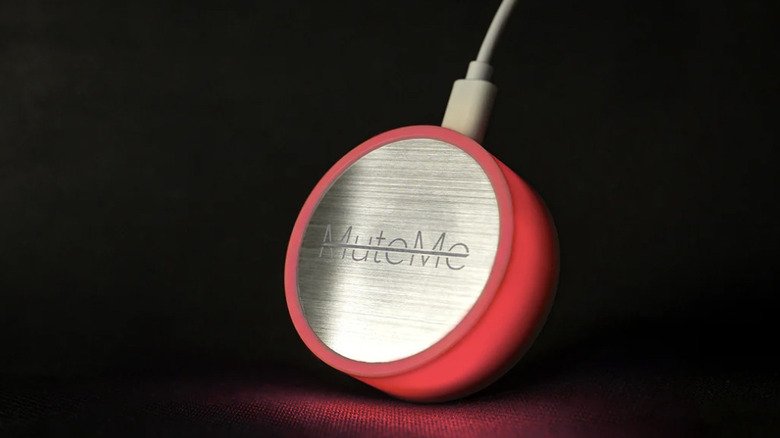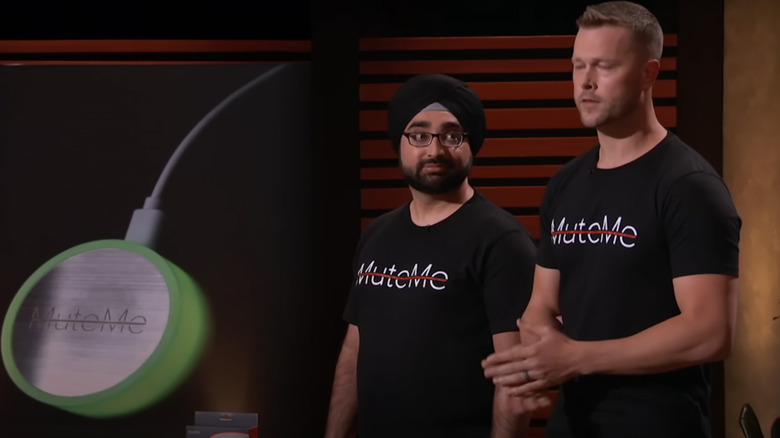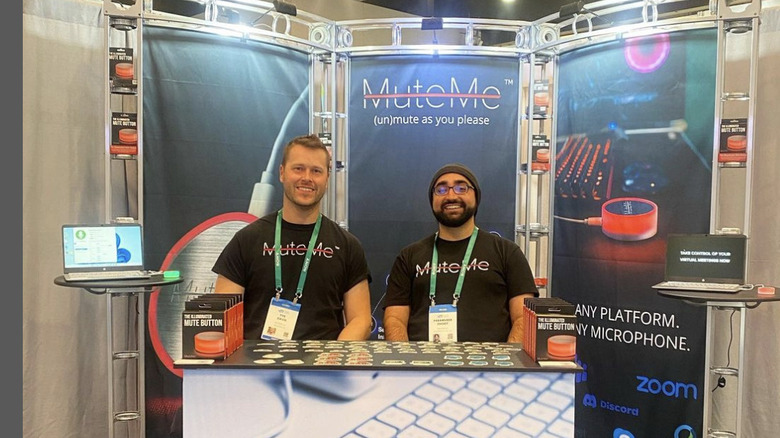What Happened To MuteMe After Shark Tank?
We may receive a commission on purchases made from links.
When the founders of MuteMe appeared on Season 13 of "Shark Tank," they presented a product idea they conceived during the thick of the COVID-19 pandemic. Five-member team Parm Dhoot, Tye Davis, Handeep Dhoop, Brittany Davis, and Pavan Purewal came up with an innovative, illuminating button that can quickly mute a computer microphone with one tap, which is perfect for those working from home. Typically, with video conferencing platforms such as Zoom and Skype, muting the microphone requires locating the appropriate button on the screen and clicking, which can take a few seconds. The MuteMe streamlines this action, making it pretty much instantaneous.
When Dhoot and Davis presented the concept to the panel of investors, they had already managed to have the device placed in Staples locations nationwide thanks to successful crowdfunding efforts. Still, the Sharks were not impressed and felt that the MuteMe wouldn't do well in the long run, even with thousands of sales. Though things did not pan out the way the MuteMe creators expected on television and "Shark Tank" does not pay its contestants for appearing on the show, the inventors didn't give up on the fun invention.
MuteMe left Shark Tank empty-handed
When two members of the MuteMe team, Parm Dhoot and Tye Davis, appeared on the ABC series in October 2021, they hoped to secure a $200,000 investment in exchange for 10% of their company. By the time of their appearance, they'd successfully raised $154,795 via Kickstarter and another $289,075 with IndieGoGo. In May 2021, the inaugural batch of MuteMe was sent out to over 8,000 buyers. The following month, the product was available in more than 1,000 stores across the country. The company had been valued at $2 million and seemed to be on the right path. However, the "Shark Tank" investors had concerns despite the $2 million valuation the founders gave the company.
Investor Mark Cuban felt that the product should be given a significant social media push and was convinced that the founders didn't know how to properly sell the device to its internet following. Fellow Shark Kevin O'Leary shared a similar sentiment, believing that the MuteMe had no place in retail stores and should instead be a product sold only online. FUBU mogul Daymond John was the only one to make an offer in exchange for a 50% stake in the company, given some revisions he felt that he needed to make, which were pointed out by Peter Jones. He believed that MuteMe being an external quieting button was simply not enough to make a big impact in the world of technology. He also expressed concern about the high manufacturing cost of $11.66 per unit. John was later swayed by his fellow panelists' concerns and took his offer off the table.
MuteMe is still going strong
In 2022, MuteMe hit a roadblock when supply chain issues plaguing nearly every industry in the world left them struggling to get a vital chip needed to create the gadgets. Unfortunately, this caused orders to ship slower than expected. The delay may have slightly impacted the company's valuation, with its current net worth estimated at around $1.6 million. Still, MuteMe continues to operate with a thriving Amazon storefront and website. When ordering from the company directly, customers have the option of purchasing the MuteMe Original for $39.00 or the MuteMe Mini for $19.00. There is also the option to order a customized enraged version, as well as bulk ordering. For those using Amazon, there is only the option to purchase the Original. Reviews on both sites have also been a testament to the product's continued popularity.
As for its social media presence, MuteMe has only attracted a little over 20,000 followers on Instagram. Judging by the limited engagement that their posts get, it appears Mark Cuban and Kevin O'Leary may have had a point when they brought up the company's weak online impact. Nevertheless, MuteMe is moving forward, and the demand appears to still be pretty steady even if it's not among the most successful products ever on "Shark Tank."


